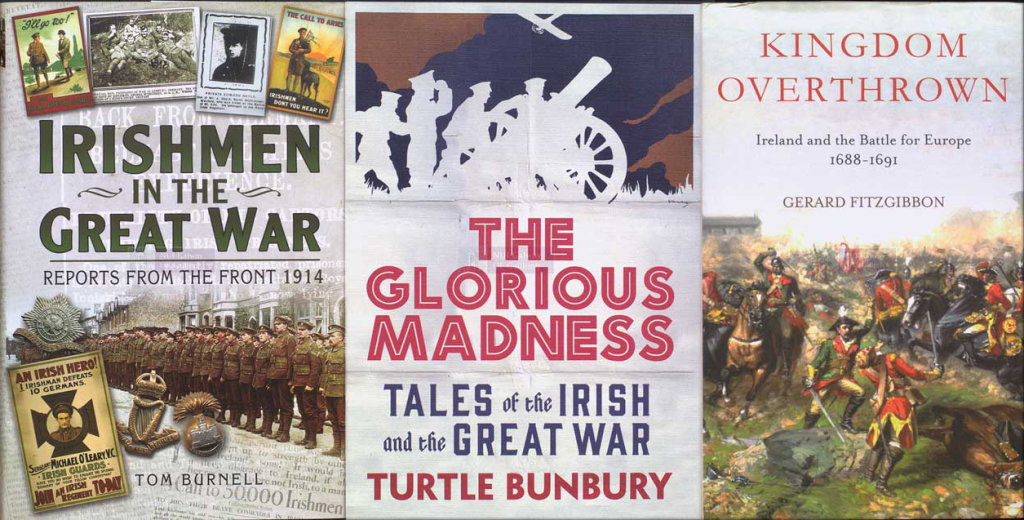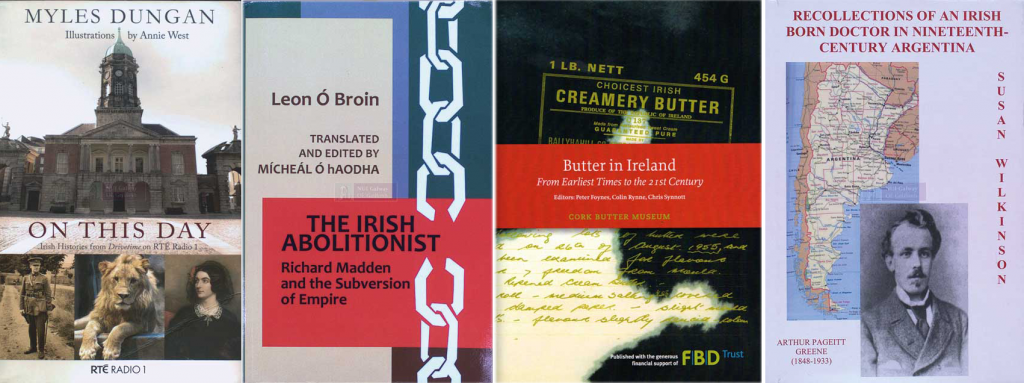BOOKWORM
Published in Book Reviews, Issue 1 (January/February 2016), Reviews, Volume 24Tom Burnell, Irishmen in the Great War: reports from the front 1914 (Pen & Sword Military, £19 hb, 252pp, ISBN 9781473821200).
Turtle Bunbury, The glorious madness: tales of the Irish and the Great War (Gill & Macmillan, €29.99 pb, 338pp, ISBN 9780717162345).
Gerard Fitzgibbon, Kingdom overthrown: Ireland and the battle for Europe, 1688–1691 (New Island Books, €24.95 hb, 426pp, ISBN 978184840).
Myles Dungan, On this day: Irish histories from Drivetime on RTÉ Radio 1 (New Island/RTÉ, €9.99 pb, 298pp, ISBN 9781848404847).
Leon Ó Broin, The Irish abolitionist: Richard Madden and the subversion of empire, translated and edited by Mícheál Ó hAodha (Cló Iar-Chonnacht, €18 pb, 483pp, ISBN 9782500942260).
Peter Foynes, Colin Rynne and Chris Synnott (eds), Butter in Ireland, from earliest times to the 21st century (Cork Butter Museum, €15 pb, 270pp, ISBN 9870955627224).
Susan Wilkinson (ed.), Recollections of an Irish born doctor in nineteenth-century Argentina: Arthur Pageitt Greene (1848–1933) (The Memoir Club, £20 hb, 164pp, ISBN 9781841045255).
Fr Denis Faul and Fr Raymond Murray, The hooded men: British torture in Ireland, August, October 1971 (V. L. Print, £8/€10 pb).
Maynooth Studies in Local History Series, Four Courts Press:
Fergal Donoghue, Crime in the city: Kilkenny in 1845 (€9.95 pb, 62pp, ISBN 9781846825811).
Pierce A. Grace, The middle class of Callan, Co. Kilkenny, 1825–45 (€9.95 pb, 60pp, ISBN 9781846825804).
Adrian Empey, Gowran, Co. Kilkenny, 1190–1610: custom and conflict in a baronial town (€9.95 pb, 65pp, ISBN 9781846825798).
David Doyle, The Reverend Thomas Goff, 1772–1844: property, propinquity and Protestantism (€9.95 pb, 71pp, ISBN 9781846825781).
Gerard Dooley, Nenagh, 1914–21: years of crisis (€9.95 pb, 75pp, ISBN 9781846825774).
Ann O’Riordan, East Galway agrarian agitation and the burning of Ballydugan House, 1922 (€9.95 pb, 69pp, ISBN 9781846825828).

Tom Burnell has been ploughing what until recently has been a lonely furrow, researching the lives of the Irish who fell in the Great War. Thankfully, the memory of these men has been restored to public consciousness and Burnell’s latest book, Irishmen in the Great War: reports from the front 1914, contains accounts of Irishmen at the front drawn from 27 local news-papers. Reports include eyewitness accounts of horrendous slaughter, along with somewhat less serious issues such as the behaviour of drunken wives. Handsomely produced, the book offers keen insights into the mentality of the Irish rank-and-file.
Popular interest in the Irish and the Great War shows no sign of waning, and Turtle Bunbury’s latest book, The glorious madness: tales of the Irish and the Great War, has been published by Gill and Macmillan. Consisting of 38 accounts, reports and profiles from the Western Front, the Dardanelles and the Balkans, this is another handsome production.
Seventeenth-century Ireland was a theatre of almost endless rivalry and destruction, as wars of religion and dynastic succession wreaked havoc across the Continent. Gerard Fitzgibbon’s Kingdom overthrown: Ireland and the battle for Europe, 1688–1691 tells the story of the Williamite War, in which Ireland became the unexpected stage for a truly European struggle. Driven by first-hand accounts from soldiers and officers in both armies, Fitzgibbon’s study presents a human narration of one of the most destructive conflicts in Irish history.
Myles Dungan’s latest publication, On this day: Irish histories from Drivetime on RTÉ Radio 1, delivers little-known episodes from the history of Ireland and the Irish people at home and abroad, offering fresh perspectives on the lives of both the renowned and the notorious. The book features a rich mix of Irish luminaries, including Michael Collins, Grace O’Malley and a range of rebels, courtesans and bandits.
Originally published in the Irish language in 1971 by Sáirséal na nÉireannach Aontaithe under the title An Maidíneach—staraí na hÉireannach Aontaithe by Leon Ó Broin, this new translation by Mícheál Ó hAodha, The Irish abolitionist: Richard Madden and the subversion of empire, is as pertinent today as when first published. As a colonial administrator and a thorn in the side of various colonial élites on three continents, Madden documented the horror of the Irish Famine and the oppression of the native aborigines of Australia.
The history of Irish butter may not catch everybody’s imagination, but for almost 4,000 years climate and topography have uniquely favoured dairy farming in Ireland. Butter in Ireland, from earliest times until the 21st century is composed of nine chapters that share a diverse disciplinary background, including archaeology and modern history. This volume, which has been produced by the Cork Butter Museum (yes, there is such a place!) and supported by the FBD Trust, traces the development of the butter trade, and the curious custom of Ireland’s bog butter, up to the modernisation of the Irish dairy industry.
Arthur Pageitt Greene completed his medical studies in Ireland in the 1870s before departing for South America. Recollections of an Irish born doctor in nineteenth-century Argentina: Arthur Pageitt Greene (1848–1933) is his account of working in the remote Pampas district, the prevalence of violence, political upheaval and the ravages of infectious diseases among the native communities. These recollections constitute the only known memoir of an Irish doctor in nineteenth-century Argentina.
The hooded men: British torture in Ireland, August, October 1971 by Fr Denis Faul and Fr Raymond Murray first appeared in 1974. The book details the brutal and degrading physical and mental torture meted out to fourteen internees by the British Army in collaboration with the RUC. It makes for chilling reading, especially as the United States and Israel are among the regimes that have since relied on a 1978 ruling from the European Court of Human Rights that what the British did to the hooded men in Northern Ireland was ‘inhuman and degrading’ but that it stopped short of torture—thus enabling them to carry out similar barbarous interrogations. The book is now reprinted in time for a new ruling on the case expected in the very near future.
The Maynooth Studies in Local History Series continues to go from strength to strength. Like their pre-decessors, these six short books are reconstructions of the socially diverse worlds of the poor and the well-off, in varied social and geographic contexts. This collection ranges geographically from Callan to Gowran and Kilkenny, through the midlands at Nenagh to east Galway and to Dublin. Socially they move from the landed world of Revd Thomas Goff and the Burkes of Ballydugan to the middle class of Callan and the medieval burghers of Gowran, through the revolutionary generation of Nenagh to the criminal world of Kilkenny. The series continues to be a model that other institutions have so far been slow to emulate—unfortunate, given the value and range of the studies of the last decade.


















